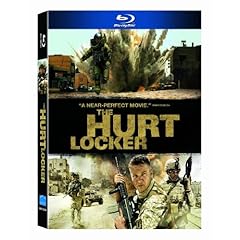
I managed to catch a couple more Best Picture nominees before the Oscars last night. Although The Hurt Locker wasn't my favorite (and isn't even on my 2009 list because of its late 2008 release in Italy), it was the most likely candidate to keep Avatar from the top prize, so I was definitely rooting for it as the night went on. It's not that I dislike Avatar, because I enjoyed it, it's that the only reason it seemed that it was getting any sort of award attention over any of the other pretty yet uninspired huge budget action movies over the years is that James Cameron made it and it earned an absurd amount of money. The only way I can see one justifying its critical success is by valuing the difficulty and uniqueness of the process over the actual quality of the result, and in my mind The Hurt Locker is in every way that's important a superior film.
Not that it isn't without its flaws, which I guess I'll get out of the way. Despite being the sort of film that you'd figure is built on details, it makes some strange errors. It takes place in 2004, yet features soldiers playing an Xbox 360 and referring to Youtube, things that didn't come around until a year later. The only thing that I can compare in terms of portraying the war is Generation Kill, and Kill certainly seemed to capture the actual experience a lot closer. There's a difference in goal, as Kill is all about trying to show the soldiers' experience, while Hurt Locker is trying to be an exciting thriller. But while they have a similar veneer of gritty realism, there are things that happen in Locker that just seem and are ridiculous. While Kill follows an entire battalion through the early invasion period, Locker focuses on a single bomb disposal unit that apparently acts autonomously and basically does what they want, which seems wrong and accounts of real soldiers back me up. Jeremy Renner plays a leader who follows his own rules and ignores standard procedure a lot. It's a good, interesting performance, and it avoids being a cliche in the story because of how things turn out. But the simple fact is a sergeant who actually acted like that would never last close to that long in the field.
Also it's funny that one of the quotes on the movie poster compares Jeremy Renner to a young Russell Crowe. Crowe is less than seven years older than Renner.
Anyway. It was a good movie. Mostly on the strength of its sound and visuals. I complained on twitter about writer Mark Boal possibly beating Quentin Tarantino for Best Original Screenplay before it happened, and I stand by that. The script does some interesting things, but for the most part it shuffles between action setpiece and soldier downtime for two hours before its solid denouement. The movie works because those setpieces are filmed so damn well. The super slow motion, the overhead shot as Renner discovers how many buried IEDs he's actually dealing with, the entire amazing desert sniper sequence, the uncompromising nature of dealing with the body bomb... it's just filled with astounding imagery that all the technical wizardry of Avatar wishes it could match the thrill of. And the sound helps every bit as much, with every explosion and gunshot having the perfect punch. The score is really good too, suiting a war movie that doesn't really act like your normal war movie.
I already discussed Renner, who did a great job in his role, and probably deserved the nomination. His two costars Anthony Mackie and Brian Geraghty are solid as the rest of his squad, and together they form a believable tension between camaraderie and hostility that help the movie survive its lack of authenticity elsewhere. Guy Pearce and Ralph Fiennes both do well in roles that are sort of funny in the way they go away so quickly, leaving the movie in the hands of the unknowns for the most part. And Kate from Lost shows up as Renner's wife which is kind of weird but doesn't really hurt the film. I've seen some debate about whether Kathryn Bigelow would have won Best Director over her ex-husband if she wouldn't have been the first woman to receive the honor, but for me it goes back to the same question as the two movies overall, and while Cameron may have poured more of his life into his movie and invented more technologies and created more out of his own imagination, what actually showed up on screen in the two films has me leaning towards Bigelow in that department. It's a film that for me totally survived off the strength of her vision, and I'm interested in exploring a bit more of her work, although some of what I've heard about it has me less sure. Still, a good film and an acceptable Best Picture.
AAAAAGGGHHHH
16 years ago


































No comments:
Post a Comment